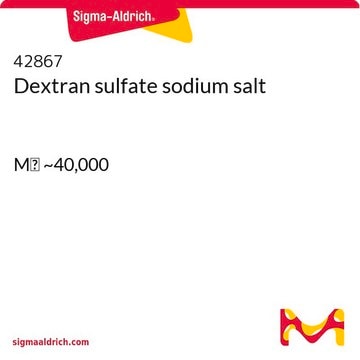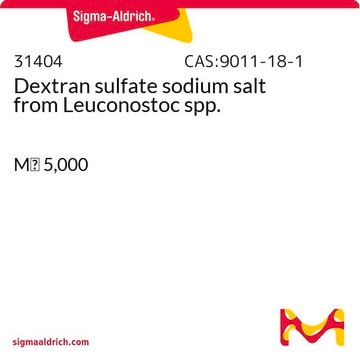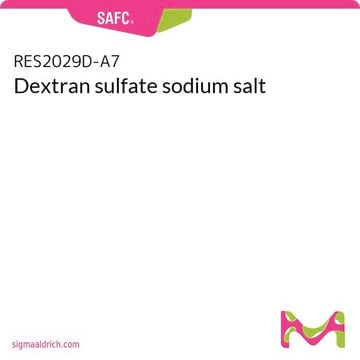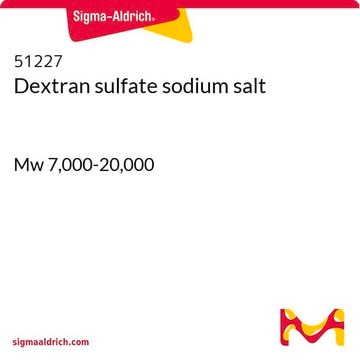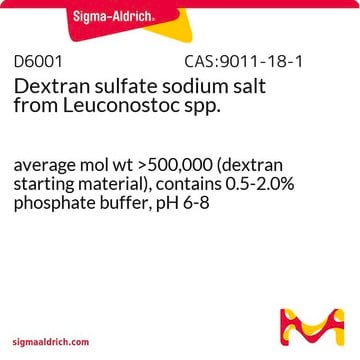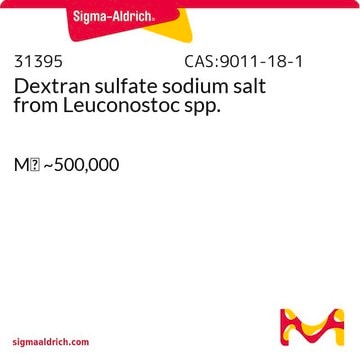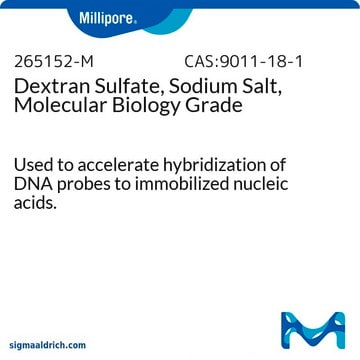D6924
Dextran sulfate sodium salt from Leuconostoc spp.
average mol wt 9,000-20,000
Sign Into View Organizational & Contract Pricing
All Photos(2)
About This Item
Recommended Products
biological source
bacterial (Leuconostoc mesenteroides)
Quality Level
form
powder
optical activity
[α]/D 90 to 105 °, c = 6% (w/v)
mol wt
average mol wt 9,000-20,000
composition
Sulfur Content, 16.0-19.0%
color
white to off-white
useful pH range
5.5 - 8.0
solubility
H2O: 100 mg/mL
storage temp.
room temp
Looking for similar products? Visit Product Comparison Guide
General description
Dextran sulfate sodium is a natural polymer of α-1,6-D-glucopyranose. It is a hydrophilic, biodegradable, and biocompatible polyanionic polymer. This highly branched polysaccharide has 1,6 and 1,4 glycosidic linkages, consisting of 2.3 sulfate groups per glucosyl unit.
Application
Dextran sulfate sodium salt from Leuconostoc spp. has been used:
- to evaluate the participation of sulfated glycans on the interaction of recombinant human proacrosin/acrosin with zona pellucida (ZP) glycoproteins
- to inject into the vitreous cavity of embryonic day five chick embryos to assess the eye size and to study its impact on cell proliferation in the retina
- to test the structural specificity of binding of TNF-stimulated gene 6 (TSG-6) to immobilized hyaluronan (HA)
Biochem/physiol Actions
Dextran sulfate may exhibit anti-coagulant and antiviral properties. It may also help to lower cholesterol levels. It is extensively used as a plasma volume expander and fibrinolytic in the medical field. Dextran sulfate can also be used as a cross-linker for chitosan (CH).
Other Notes
To gain a comprehensive understanding of our extensive range of Dextrans for your research, we encourage you to visit our Carbohydrates Category page.
Storage Class Code
11 - Combustible Solids
WGK
WGK 2
Flash Point(F)
Not applicable
Flash Point(C)
Not applicable
Personal Protective Equipment
dust mask type N95 (US), Eyeshields, Gloves
Choose from one of the most recent versions:
Certificates of Analysis (COA)
Lot/Batch Number
Don't see the Right Version?
If you require a particular version, you can look up a specific certificate by the Lot or Batch number.
Already Own This Product?
Find documentation for the products that you have recently purchased in the Document Library.
Customers Also Viewed
Laura I Furlong et al.
Fertility and sterility, 83(6), 1780-1790 (2005-06-14)
To characterize proacrosin/acrosin interaction with isolated zona pellucida (ZP) components. Prospective study. Basic research laboratory. Recombinant proteins derived from human proacrosin (Rec-40, Rec-30, Rec-20, Rec-10, and Rec-6) and from human ZP glycoproteins (rec-hZPA, ZPB, and ZPC). In vitro binding assay
Hans-Georg Wisniewski et al.
The Journal of biological chemistry, 280(15), 14476-14484 (2005-02-09)
TSG-6 protein, up-regulated in inflammatory lesions and in the ovary during ovulation, shows anti-inflammatory activity and plays an essential role in female fertility. Studies in murine models of acute inflammation and experimental arthritis demonstrated that TSG-6 has a strong anti-inflammatory
Osama A Madkhali et al.
Scientific reports, 11(1), 9914-9914 (2021-05-12)
The purpose of this study was to develop a novel nano antibacterial formulation of dextran sulfate sodium polymer. The dextran sulfate sodium (DSS) nanoparticles were formulated with gelation technique. The nanoparticles exhibited significant physicochemical and effective antibacterial properties, with zeta
Willi Halfter
Investigative ophthalmology & visual science, 49(8), 3289-3298 (2008-03-26)
The vitreous body (VB) is a transparent, extracellular matrix structure that fills the vitreous cavity of the eye. Major constituents of the VB are hyaluronic acid (HA) and glycosaminoglycans (GAGs), both of which are highly charged, linear carbohydrate polymers. The
Yi-Nan Zhang et al.
ACS nano, 14(8), 9478-9490 (2020-06-02)
Nanovaccines need to be transported to lymph node follicles to induce humoral immunity and generate neutralizing antibodies. Here, we discovered that subcapsular sinus macrophages play a barrier role to prevent nanovaccines from accessing lymph node follicles. This is illustrated by
Our team of scientists has experience in all areas of research including Life Science, Material Science, Chemical Synthesis, Chromatography, Analytical and many others.
Contact Technical Service
